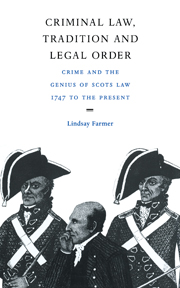Book contents
- Frontmatter
- Contents
- Acknowledgements
- 1 The boundaries of the criminal law: criminal law, legal theory and history
- 2 The genius of our law: legality and the Scottish legal tradition
- 3 The judicial establishment: the transformation of criminal jurisdiction 1747–1908
- 4 The ‘well-governed realm’: crime and legal order 1747–1908
- 5 The perfect crime: homicide and the criminal law
- 6 Conclusion: crime and the genius of Scots law
- Bibliography
- Index
5 - The perfect crime: homicide and the criminal law
Published online by Cambridge University Press: 08 January 2010
- Frontmatter
- Contents
- Acknowledgements
- 1 The boundaries of the criminal law: criminal law, legal theory and history
- 2 The genius of our law: legality and the Scottish legal tradition
- 3 The judicial establishment: the transformation of criminal jurisdiction 1747–1908
- 4 The ‘well-governed realm’: crime and legal order 1747–1908
- 5 The perfect crime: homicide and the criminal law
- 6 Conclusion: crime and the genius of Scots law
- Bibliography
- Index
Summary
Introduction: the ‘murder mystery’
A staple feature of crime fiction, especially familiar no doubt to readers of Agatha Christie novels, is the quest for the ‘perfect crime’. Usually, though not necessarily, it involves the murder of an unwanted spouse. The motive may be sexual jealousy, the desire for a more precipitate inheritance of the family fortune, or perhaps an unusually lavish insurance policy. The murderer surrounds the crime with false clues to conceal the motive, to cast the blame on another and, crucially, to outwit the master-detective called in as a foil to the methodical but inevitably plodding police detectives. The real criminal is, of course, discovered because of some chance inconsistency in the evidence or some overlooked detail. They confess, remorsefully or cheerfully, and are carried off by the waiting police. The sword of justice inexorably, unerringly, falls on the transgressor. The moral of the story is that crime does not pay. There is no such thing as the perfect crime.
This chapter is also a kind of murder story, for it will be argued that the law of homicide has been fundamental to the development of modern criminal law theory. It has been the ‘perfect crime’, providing the central point around which the modern theory of the criminal law has been constructed. The conventional history of the criminal law sees the origins of the individualism of the modern law in the great projects of codification in the period of the Enlightenment. These, it is argued, sought to systematise the law around a philosophical conception of the individual as rights bearer and property owner.
- Type
- Chapter
- Information
- Criminal Law, Tradition and Legal OrderCrime and the Genius of Scots Law, 1747 to the Present, pp. 142 - 174Publisher: Cambridge University PressPrint publication year: 1996



